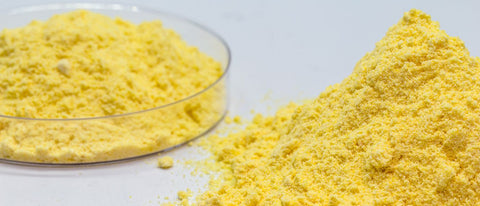
Florian ist aufgewachsen auf einem Bauernhof. Umgeben von Pferden, entdeckte er früh seine Faszination für diese majestätischen Tiere. Inspiriert von seiner reitbegeisterten Mutter, entwickelte er das Nahrungsergänzungmittel - Pferdegold. Seine tiefe Verbundenheit zur Natur und die leidenschaftliche Hingabe zu Pferden trieben ihn an, sein Unternehmen zu gründen.
The role of sulfur in horse nutrition is unparalleled. Sulfur is not just an element in the periodic table, but an essential component in the horse's diet.
This small but powerful component in our horses' diet can make a decisive contribution to their well-being.
Sulfur is more than just a nutrient; it is an essential building block for the long-term vitality of our horses.
Whether in the form of sulfur flower or sulfur MSM, the positive effects on the horse's health can be diverse.
From strengthening hooves to supporting joint function, sulfur for horses is considered a true all-rounder.
In this guide, we explore how sulfur affects our horses and how you can effectively incorporate it into your diet.
We offer you sound information and practical tips to get the most out of the essential nutrient sulfur.

MSM Explained: Everything You Need to Know About Organic Sulfur
Organic sulfur, which you've probably heard of under the name MSM , is considered a true miracle cure for horses.
It's about more than just relieving joint pain; MSM is said to have a variety of positive effects on a wide range of bodily functions in horses.
From improving the condition of the skin and coat to strengthening the hooves – the effect of MSM on horses is considered comprehensive.
So, can MSM provide horse owners with essential support that goes far beyond conventional feed?
Let's take a closer look.

Perfect for your horse: Pferdegold® supplementary feed!
These specially developed supplements support your horse's diet and provide it with natural nutrients. Made in Germany, grain-free and drug-free, they come with a 30-day money-back guarantee.
Try it now!The essential role of sulfur for horses
Sulfur, an essential element in horse nutrition, can support numerous bodily functions and even contribute to the horse's appearance.
This nutrient can be added to horses' diets in various forms, including flower of sulfur and MSM . Its role is diverse and can range from supporting hoof quality to promoting a healthy coat . A balanced sulfur intake is therefore essential for the overall well-being of horses .
➽ Sulfur effects at a glance:
-
Hoof health: Sulfur can play an important role in supporting healthy and strong hooves.
It is said to contribute to hoof strength and thus even have a preventative effect against hoof diseases . A sufficient supply of sulfur is therefore beneficial for the general mobility and health of horses.
-
Joint support: Sulfur is said to help support joints by stimulating collagen production . This can be particularly beneficial for active and older horses, as it is said to support joint elasticity and help relieve joint pain.
-
Skin and coat care: Adequate sulfur supply can have a positive effect on the coat and skin of horses.
This can help keep the coat shiny and healthy and the skin supple and resistant to skin problems.
-
Immune system strengthening: Sulfur can play a supportive role for the immune system of horses.
A sufficient supply of this nutrient is said to contribute to the general health and strengthen the immune system of horses.
-
MSM Applications: MSM, a popular organic sulfur source, is used in various areas due to its supportive properties .
These can range from relieving inflammation to helping with skin problems.
-
Sulphur flower horse application: Sulphur flower is a natural sulfur mineral that can be used for skin care in horses.
It is valued for its supportive properties in skin problems and can be used as part of a comprehensive care program for your horse.

Sulfur for vital joints: How effective is it?
Sulfur is said to play a key role in supporting joint health in horses.
Organic sulfur, such as MSM, is said to have supporting properties in joint metabolism . It is said to contribute to the maintenance of joint function by supporting collagen formation and joint flexibility.
A balanced sulfur intake could therefore be beneficial to promote the horse's mobility and well-being.
Strengthening the immune system: Can the element relieve cold symptoms?
Sulfur, especially in the form of MSM, can also provide support for the immune system of horses.
Its antioxidant properties and role in the production of amino acids are central to a robust immune system.
MSM can strengthen the body's defense mechanisms , which may help relieve cold symptoms.
However, it is important that a balanced diet and appropriate care remain fundamental to maintaining a healthy immune system.
How MSM can promote skin, hair and horn
MSM, an organic sulfur, is known for its positive effects on skin , hair and horn .
MSM can promote the structure of hair and horn and is said to lead to a healthier appearance.
MSM's support of collagen production can help maintain elastic skin.
Regular intake should lead to a shiny coat and strong hooves, which can contribute to your horse's vital appearance.

This is the daily sulfur requirement of a horse
A horse's daily sulfur requirement depends on various factors, such as size, age, activity level and health status .
In general, a requirement of 1 to 2 grams of sulfur per kilogram of dry matter intake is assumed.
This need can be met through a balanced diet rich in sulfur-containing amino acids.
It is important to regularly check and adjust the feed ration to ensure optimal nutrition.
How the element is used in horse feeding
The supply of sulfur-containing amino acids is important in horse feeding. This table provides an overview of the methionine and cysteine content in various feeds.
It helps to optimize the sulfur supply in your horse's diet.
Table of feedstuffs and their content of sulfur-containing amino acids methionine and cysteine.
| Animal feed | Methionine (g) | Cysteine (g) | Description |
| Brewer's yeast | 6.7 | 5.0 | Rich in B vitamins and minerals |
| Peanut extraction meal | 4.6 | 6.9 | High protein content, high energy |
| Fresh pasture grass | variable | variable | Natural sulfur spring |
| Oats | 1.8 | 2.3 | Good source of energy, rich in fiber |
| alfalfa | 3.2 | 1.4 | High protein content, rich in minerals |
| corn | 1.8 | 1.9 | Energy-dense, carbohydrate-rich grains |
| Soybean meal | 6.6 | 6.9 | High protein content, essential amino acids |
| Wheat feed meal | 2.4 | 2.9 | Rich in starch and protein |
| Wheat bran | 2.2 | 2.8 | Rich in fiber, good for digestion |
Source - Table values, except for pasture grass, taken from: Manfred Kirchgessner, Animal Nutrition, 14th updated edition 2014
The effects of too much or too little sulfur for horses
The effects of insufficient or excessive sulfur intake in horses can be significant.
Symptoms of a sulfur deficiency can include brittle hooves, dull coats , and impaired immune systems .
An excess of sulfur, especially in the form of MSM, can cause side effects such as digestive disorders.
It is therefore important to carefully balance the sulfur intake to ensure optimal health and well-being of the horse.

Pferdegold® supplementary feed!
Pferdegold is a small family business from Bavaria with a big dream: to produce the best horse feed. We see ourselves as a family of equestrians who want to provide your horse with the ideal nutrition. 100% natural and perfectly tailored to your horse's needs.
Try it now!Conclusion
Imagine your horse galloping across the pasture, with strong hooves and a shiny coat – what could be more beautiful?
In the world of horse nutrition, sulfur is a real “power pack” that can serve your horse well.
The right sulfur balance in feed can effectively promote the quality of hooves, joints, coat and immune system.
Sulphur, in the correct dosage, can contribute to a completely satisfied and vital horse.
It is important to check the sulfur supply regularly and ensure that your horse can receive an optimal supply of this powerful element.
FAQ
How do you know if your horse is getting enough sulfur?
An indicator of adequate sulfur supply is a healthy appearance of the hooves and coat. Signs of a sulfur deficiency can include brittle hooves and a dull coat.
Monitor these signs regularly and adjust your horse's feeding if necessary.
Monitoring your horse's overall health and behavior is also important. Look for signs such as lethargy or reduced performance, which could indicate a nutrient deficiency.
Can sulfur affect your horse's digestion?
Yes, a balanced sulfur intake can have a positive effect on digestion. However, an excess can lead to digestive problems such as diarrhea.
Therefore, ensure the dosage is correct. When introducing sulfur supplements into the diet, it is advisable to do so gradually.
Is sulfur also important for older horses?
Yes, an adjusted sulfur intake can be particularly beneficial for older horses. Sulfur can support joint health, which can be especially relevant in old age.
With older horses, consider that their nutritional needs may differ from those of younger ones. A supplemental sulfur supplement can help maintain their mobility and quality of life.
Can sulfur supplementation be helpful for sport horses?
Yes, sulfur supplementation can be beneficial, especially for sport horses, as it can support joint function and overall mobility.
Such a supplement can also contribute to overall performance, which can be crucial in training and competition.
However, ensure that the supplement is balanced and tailored to the needs and, if necessary, seek the advice of a horse nutrition expert to achieve optimal results.

















